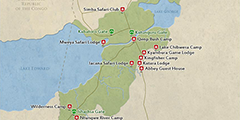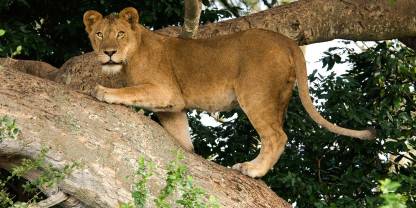Queen Elizabeth National Park is Uganda’s most popular safari destination. Dominated by , this diverse park also incorporates rainforests, swamps and volcanic crater lakes. Four of the Big Five are present (no rhino), along with chimps and various antelopes and monkeys. A staggering 610 bird species have been recorded. A highlight is boat trips on the Kazinga Channel connecting Lakes Edward and George (both of which lie partially within the park boundaries). and guided forest walks are also available.

-
Best Time To Go
- January to February and June to July (Dry seasons)
-
High Season
- June to September (Peak time for Uganda)
-
Size
- 1,978km² / 764mi²
-
Altitude
-
884-1,337m /2,900-4,386ft
 View Photos
View Photos
 View Photos
+24
Photos
View Photos
+24
Photos
 Open Map
Open Map
Pros & Cons
- Top wildlife viewing includes four of the Big Five (no rhino)
- Boat trips on the Kazinga Channel are a highlight of any Uganda safari
- Tree-climbing lions inhabit the Ishasha Plains
- is possible in Kyambura Gorge and nearby Kalinzu Forest Reserve
- Excellent birding with at least 610 species recorded
- The Mweya Peninsula and Kasenyi Plains can be busy in high season
- A main road bisects the park and people live along the boundaries
Wildlife
Queen Elizabeth NP offers the most reliable lion viewing in Uganda. These iconic big cats are most easily located on the Kasenyi Plains, which lies in the northeast of the park, bordering Lake George. They can also be seen on the Ishasha Plains in the far southwest, where they regularly climb trees. Huge herds of buffalo and elephant might be encountered anywhere. You’re certain to see large numbers of hippo and other grazers on the Kazinga Channel. Lucky visitors might also spot more unusual creatures such as leopard or giant forest hog.
More about Queen Elizabeth NP’s wildlifeScenery
Queen Elizabeth NP is bisected by the equator below the Rwenzori Mountains. This is Africa’s third-highest massif, and on cloudless days its glacial peaks provide a spectacular backdrop to the Kazinga Channel and Kasenyi Plains. Most of the park comprises open , but you can also visit Kyambura Gorge (a popular venue) and the extensive Maramagambo Forest. Other features include Lakes Edward and George, and around a dozen small crater lakes.
Activities
Most popular is a boat trip on the Kazinga Channel. This offers a wonderful opportunity to watch hippos, elephants, crocodiles and waterbirds in action. usually focus on the Kasenyi Plains, where lion and buffalo are common. Drives can also be undertaken in Ishasha to look for tree-climbing lions. Other guided activities include tracking chimps in Kyambura Gorge, banded mongooses on the Mweya Peninsula, and radio-collared lions and leopards with the Queen Elizabeth Predator Project.
Weather & Climate
Queen Elizabeth NP’s nearness to the equator ensures consistently warm temperatures throughout the year. Heavy rain that can make some minor roads impassable is a feature of the two Wet seasons, from March to May and August to December. Although there’s no official Dry season, rainfall decreases somewhat (though not entirely) over January to February and June to July.
More about the weather and climateBest Time To Visit
Brief but drenching rainstorms often characterize the days of the Wet seasons (March to May and August to December), but this is when the environment is at its most beautifully lush. It’s also when migratory birds pass through the region (from November to April). For , it is best to visit in the drier months (January to February and June to July), when trails are more solid underfoot.
More about the best time to visit



